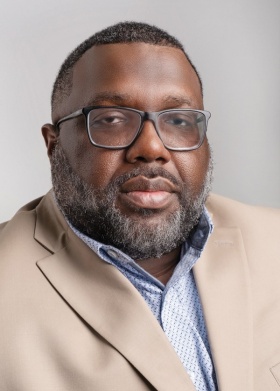UB expert: How educators can challenge racism and become more racially literate
LaGarrett King is founding director of the Center for K-12 Black History and Racial Literacy Education, housed within the UB Graduate School of Education
Release Date: July 20, 2022
BUFFALO, N.Y. — At the start of 2022, the University at Buffalo Graduate School of Education launched the Center for K-12 Black History and Racial Literacy Education under the leadership of renowned scholar LaGarrett King.
The center uses research, teacher professional development, networking and advocacy to address the enduring question: What is Black history education? The goal is to improve how Black history and race are taught and learned around the world in K–12 schools, teacher education programs and other educative spaces.
In the aftermath of the racist mass shooting that targeted Buffalo’s Black community on May 14, King took time to share perspectives on what educators in Western New York and beyond can do to challenge racism and confront hate.
King, PhD, is founding director of the UB Center for K-12 Black History and Racial Literacy Education and an associate professor of social studies education. His primary research interest examines the teaching and learning of Black history in schools and society. King says:
“There are several things that educators can do in challenging racism and becoming more racially literate. First, educators need to take a self-assessment of how their identity was formed. For most, ideas and our lived experiences around race, along with geography, class, gender, sexuality and more has influenced how we perceive ourselves and others. This may mean leaving racial comfort zones and being open to experiencing others’ lives.
“Second, educators need to believe that institutional and structural racism exist in this world. This does not mean being a blind advocate but to begin and continue to unlearn histories that ignore the history of race. Educators must be proactive for self-learning and demand from their school districts professional development learning plans that help them learn about the history, sociology, psychology and economics of racism and how it continues to influence life chances. Learning content is not enough; educators need to also know how to effectively use that content knowledge with appropriate instruction.
“Third, educators should listen and learn from communities and students of color who have experienced racism. This should be a judge-free zone where the objective is to listen to what these persons are conveying and not be offensive. Additionally, educators need to understand that different people have different experiences, even those who may have limited experiences around race and racism. This does not negate that racism exists; Black and other non-white people do not have monolithic experiences.
“Last, it is OK not to know or be an expert in the subject. Demand help from your administrators, school districts, unions, communities and other spaces of learning.”
Media Contact Information
Charlotte Hsu is a former staff writer in University Communications. To contact UB's media relations staff, email ub-news@buffalo.edu or visit our list of current university media contacts.
